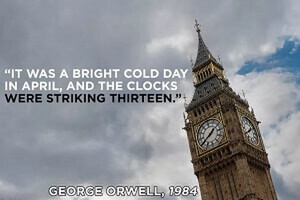Ever since Herman Melville began his novel Moby Dick with the words, "Call me Ishmael" authors have wrestled with that all-important first line.
Who can forget Charles Dickens beginning A Tale of Two Cities with, "It was the best of times, it was the worst of times ..." or Orwell's quote from 1984.
Ah yes, that first line - how we agonise over it - and I wonder if Charles, Herman and George worried over theirs or if they just thought, "You know what? I'm going to start my book like this."
I enjoy browsing in bookstores and in Auckland we're blessed with some great ones like The Women's Bookshop in Ponsonby, Time Out in Mt Eden and the fabulous Unity Books in High St. I'm a magpie when it comes to book covers - I'm attracted to flashy ones. That's the first thing that catches my eye. The title is right up there too - it's a contest over which gets me first.
I'll pick up the book and the next thing I do is turn to the first page and read the first few sentences. If they don't grab me, down it goes and I'm foraging again.
The other day in the library I picked up a book called Shelter In Place by Alexander Maksik. True to form, it was the cover that attracted me - a picture of misty pine trees in colours of grey and white. It reminded me of the Pacific Northwest where I was born and indeed lived for a number of years and sure enough, the blurb inside the cover said it was set there. Then I went to the opening line and here's what it was: "In the summer of 1991 my mother beat a man to death with a twenty-two ounce Estwing hammer and I fell in love with Tess Wolff."
Gotcha. Right away I wanted to know why his Mom killed some guy with a hammer and who is Tess Wolff.
First lines are even more important in shorter items, like magazine articles and essays. Each sentence must induce the reader to keep going: first sentence leads to second, second to third and so on. There's a bit more leeway in a novel but still that opening will hook the reader in ... or not.
And you must keep the promise to the reader that you make in the opening line. Mr. Maksik's book does, but it is a bit of a ramble and somewhat repetitive so I can't say hand on heart that he delivers to my satisfaction as a reader but he does deliver. There's nothing worse than reading through a book, feeling progressively disappointed and let down, and if you do make it to the end, thinking, "What a swizz! The writer never really told me who murdered who, or why."
So writing a good beginning can take skill, and time, crafting the all important hook that will interest your reader right from the start. We're all different in how we approach that first line; sometimes we'll write it after we've finished the book, maybe it comes first as the inspiration for the entire work.
However it comes, make it good, irresistible, kick-ass. Entice your reader to keep going, entertain him/her with the freshness of your words and the originality of your ideas, surprise us, engage us, make us think, and lead us by the nose into your book.
TAGS
Writing that all-important first line
August 22, 2017
